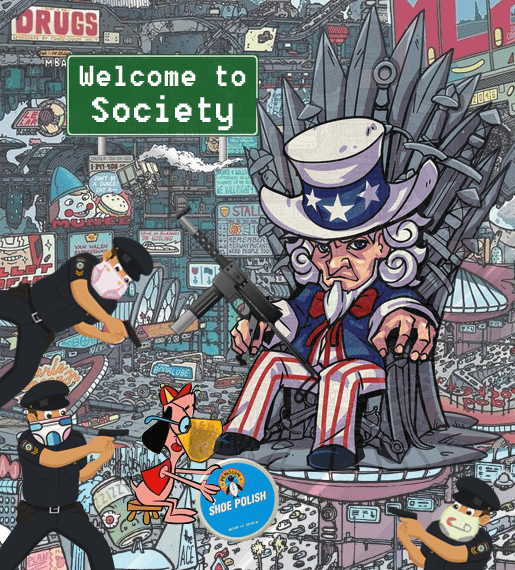Have you ever found yourself holding back your true thoughts and opinions in fear of standing out or facing criticism? You’re not alone. Many people choose self-censorship and conformity over freedom of expression in order to fit in and avoid conflict. But why do we prioritize comfort and acceptance over the fundamental right to speak our minds?
The Fear of Social Alienation and Rejection
Imagine this, you’re at a social gathering, surrounded by friends, family, or colleagues. A controversial topic surfaces, and you have an unpopular opinion. What do you do? Many of us, in this scenario, would suppress our true feelings to avoid any potential conflict or social discomfort. This is the fear of social alienation and rejection in action.
As inherently social beings, we yearn for acceptance and approval from our peers. The relationships we foster provide us a sense of belonging, emotional support, and personal validation. These bonds are fundamental to our survival and well-being. So it’s no wonder we feel trepidation at the idea of jeopardizing these connections by expressing a dissenting viewpoint.
Suppose we hold an opinion that is deemed “out of line” with the prevailing views of our social circle. In that case, we risk being excluded or rejected, which is a frightening prospect for most of us. To avoid the sting of ostracization, we tend to align our thoughts with those of our peers through conformity bias. We trade our individual perspectives for the comfort and safety of comfort.
Of course, there are exceptions. Some people are comfortable standing alone, even reveling in their unique perspectives. But for most, the fear of alienation and social rejection is a powerful deterrent against free expression. We often prefer the path of least resistance, the quiet comfort of conformity and self-censorship, rather than risk the perils of social exclusion.
The Perils of Speaking Truth to Power
There’s a saying that goes, “The nail that sticks out gets hammered down.” This adage rings true when it comes to expressing divergent views, particularly when they challenge prevailing authorities or societal norms. Even in nations that champion freedom of speech, wielding this right is not always devoid of serious consequences.
Pioneers who dare to question the status quo or dispute authority often face considerable backlash. These bold individuals might be subjected to public ridicule, or worse, character defamation. They might find their professional lives in jeopardy as they risk being shunned in their respective industries, or even lose their jobs. In some drastic scenarios, speaking against power can result in severe legal repercussions, including imprisonment.
These potential outcomes create an atmosphere of fear and caution around free expression, causing many to retreat into the fortress of conformity and self-censorship. Despite having the liberty to voice their views, many individuals choose to mute their dissent and align with mainstream thought.
It’s also important to consider the psychological toll this can take. The constant vigilance required to monitor one’s words and actions, coupled with the fear of potential backlash, can be mentally exhausting. It’s a tightrope walk between exercising one’s right to freedom of expression and ensuring personal and professional safety.
While we can argue that free speech should come without retribution, the reality is often far more complicated. And so, the hazardous path of speaking truth to power remains less trodden, with many choosing the smoother, safer road of conformity and self-censorship. As history has shown, those who dare to walk this precarious path do so at their own risk. It’s a brave act, no doubt, but one fraught with perils.
Navigating Groupthink and Peer Pressure
Groupthink, hive mindset, an interesting phenomenon, yet a formidable force that encourages individuals to lean towards conformity. This psychological circumstance arises when the collective decision-making of a group is prioritized over individual perspectives. Under the influence of groupthink, there’s a subtle yet persistent pressure to align with the consensus, to ‘go with the flow’, and in doing so, we often suppress our unique viewpoints.
This can be seen in various settings, from corporate boardrooms to casual friend gatherings. The desire to maintain harmony and unity within the group often overpowers the urge for independent thought and expression. In fact, the very notion of contradicting the group consensus can be daunting, leading many to silence their dissent and adopt the group’s ideas instead.
Moreover, the power dynamics within a group can play a crucial role in fostering conformity. Those who wield greater influence can often sway the group’s collective thought process. Subsequently, other group members may feel compelled to agree, opting for the familiarity of the group’s shared ideas rather than standing alone with their divergent thoughts.
Peer pressure too, plays a significant role in steering us towards conformity. The social influence exerted by our peers can impact our attitudes, values, and behaviors. The anticipation of validation and approval from our peer group often causes us to modify our views, aligning them with what’s deemed ‘acceptable’ by the group.
And so, groupthink and peer pressure create an environment where conformity is rewarded and divergence is discouraged. This can pose a real challenge to freedom of expression, as we wrestle with the desire to express our individual thoughts versus the need to fit in. But it’s crucial to remember that while the pressure to conform can be intense, our unique ideas and perspectives have value. After all, it’s often the outliers, the contrarians, those willing to challenge the status quo who drive innovation and spark meaningful change.
The Weight of Public Perception
In the court of public opinion, perception reigns supreme. It’s a potent force that can have a profound influence on our behavior and the choices we make. We naturally care about how others perceive us, it’s an integral part of our social fabric.
We strive to present ourselves in the best possible light, fearful of being viewed negatively or misunderstood. This fear often restricts us from expressing our true thoughts and feelings, leading us to carefully curate what we say and how we say it.
We intuitively understand that our reputation and the way we are perceived by others can have a real impact on our lives, from our relationships to our professional opportunities. So, many often opt for the safer route of presenting ourselves in alignment with socially accepted norms and expectations, which can sometimes mean stifling our true opinions and conforming to popular viewpoints.
Even though we have the right to express our individual perspectives freely, the fear of unfavorable public judgment can be a formidable roadblock. Just the mere thought of being ridiculed, misunderstood, or criticized can deter many from expressing their thoughts openly. This cautious self-editing, dictated by the weight of public perception, can lead to self-censorship.
However, it’s crucial to note that while caring about public perception is natural, letting it control our expressions could undermine our authenticity. Each one of us has a unique voice and a distinct viewpoint that is valuable. The challenge lies in navigating the tricky terrain of voicing our opinions while managing potential negative perceptions. It’s important to remember that the public perception is not the definitive measure of our worth. It’s a collective viewpoint that is often fluid and subjective.

The Seduction of Safety and Comfort
The allure of safety and the warmth of comfort in conformity often draw us in like a moth to a flame. The act of aligning ourselves with societal norms and accepted viewpoints creates a kind of social shield, protecting us from the arrows of criticism and the risk of rejection. Conversely, exercising freedom of expression is like embarking on a treacherous journey, fraught with the perils of conflict and controversy.
Who wouldn’t be tempted by the invitation to a more peaceful existence? A life where you’re rarely questioned, hardly criticized, and generally accepted by the masses. The tranquility that conformity offers is like a soft, warm blanket in a cold room. It’s soothing, calming, and most importantly, it’s safe.
But this safety comes at a cost. It requires you to mold and shape your thoughts, to suppress the whispers of dissent, to stifle the inner voice that seeks to question, challenge, or differ. It’s a silent transaction where you trade off a part of your unique self for the promise of social acceptance and relative peace.
Freedom of expression, on the other hand, can feel like standing on the edge of a cliff, looking down at a sea of contrasting opinions and potential confrontations. It’s the risk of stepping into an open battlefield armed with nothing but your words and beliefs. It’s daring to stick out in a crowd, inviting attention, scrutiny, and potentially, controversy.
The road less traveled is rarely a comfortable one. It’s marked with unpredictability, resistance, and frequent challenges. But it’s also a road that promises self-discovery, authenticity, and the exhilarating freedom of voicing your own unique perspective.
Indeed, the magnetic pull of safety and the allure of comfort in conformity can be incredibly hard to resist. But as we navigate through this world of opinions, beliefs, and expressive liberties, we must also question if the cost of this comfort is worth the stifling of our authentic voices.
The Effects of Social Media and Public Scrutiny
In the digital age, social media platforms have revolutionized how we share and consume information. Our thoughts and opinions, once shared in private conversations or small gatherings, are now broadcasted across the realm. These platforms, though instrumental in fostering connections and conversations, have inadvertently heightened public scrutiny of our beliefs and viewpoints. With the ease of a click, a controversial post or tweet can ignite instant judgment, inciting a virtual avalanche of critique, often severe and unforgiving.
This amplified scrutiny has birthed a virtual echo chamber, where divergent thoughts are suppressed, and conformist narratives amplified. It’s akin to a large-scale manifestation of groupthink hive mindset, where mainstream views gain precedence, overshadowing individual perspectives. This heightened public scrutiny, paired with the fear of social backlash, often encourages us to be selective and cautious about what we share online.
Under this digital spotlight, we’re no longer just contending with the immediate reactions of our close circle but also the potentially volatile reactions of the faceless crowd. It can be a daunting prospect, even for the most courageous amongst us. The result? Many of us retreat into the digital equivalent of conformity and self-censorship, curating our online personas to align with what’s deemed ‘socially acceptable’. This retreat is not indicative of a lack of conviction but rather an instinctive response to protect ourselves from the unpredictable waves of online criticism.
In the end, while social media has granted us the platform to express our views to a global audience, it’s also fostered an environment that can stifle free expression. As we navigate these platforms, the challenge lies in maintaining our authenticity amidst the pressures of public scrutiny and the ease of digital conformity. Indeed, this virtual world has added a new layer of complexity to our ongoing dance between conformity and the freedom of expression.











